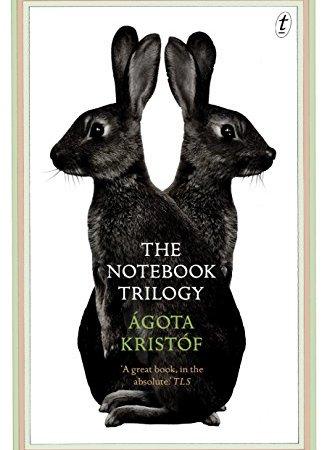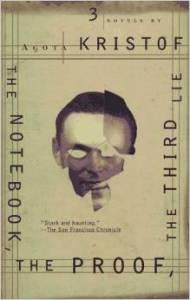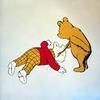

Written by an unreliable narrator, the first part of this trilogy, The Notebook, won two prestigious European literary awards and was Hungarian writer Agota Kristof's debut novel, published when the author was 51. It is, along with The Proof and The Third Lie, astonishing and brilliantly written in the tone of a moral fable. All the novels use beautifully simple, even clinical, language, from a first person viewpoint. What's remarkable about them is the pure clarity of voice and language and - most importantly - morals without sentimentality, and the rejection of conventional, socially conformist behaviour.
With the onslaught of WW2, in an unnamed Hungary, identical twin brothers C(K)laus and Lucas record an 'objective' narrative of each day or days of significance that each agrees must be dependent solely on fact. This means that the brothers destroy any daily account that reflects judgement, whether implied or explicit, whether emotional, moral or even tonal in the words they use.
Only once they approve the best version of the day's events, do they commit one as the permanent record of that day, to be written up in the Notebook.
Their purity of purpose and determination to lead lives grounded in their own way, extends to them deciding to strip themselves of emotion as they learn to disregard and be invulnerable to the devastating consequences of war. They also choose to act on occasion in ways that threaten and harm those who harm others, and always based upon their own distinctive, yet always logical, moral code. As a metaphor for the impact of war on children it's a powerful and compelling one.
The more you read, the more troubling the stories of each novel, yet the more enriched and nuanced the overall story becomes.
The novels don't shy away from the impact of war, psychological, social or physical. Limbs and people destroyed, antisemitism wreaked, loved ones blown apart. Life goes on, but always the factual narrative strips life of value and meaning as the war dehumanises and devastates. While the brother(s) survive(s), it's clear not in any meaningful way living. There's no joy felt or shared, no relief described, no coming to terms. The tone becomes ever more despairing and melancholic, as WW2 transitions into what is clearly meant to be Russia's occupation of the country.
To describe the plots would be to undermine the intensity of loss, sadness, disorientation and trauma of war inflicted upon the narrator(s). What matters most is the extraordinary perspective of the brothers/unreliable narrator. It's a troubling, powerful, moving story, driven by conflict, often disturbed and disorientating. It never resolves, which, given the subject of war and loss, is surely a morally honest conclusion and one free from false sentiment. Utterly compelling (especially The Notebook), the trilogy is highly recommended for lovers of great, modernist literature.

